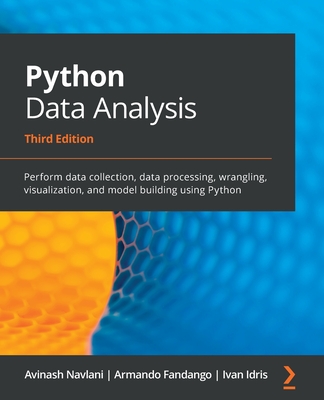Machine Learning Algorithms: Popular algorithms for data science and machine learning, 2nd Edition
暫譯: 機器學習演算法:數據科學與機器學習的熱門演算法(第二版)
Giuseppe Bonaccorso
- 出版商: Packt Publishing
- 出版日期: 2018-08-30
- 售價: $2,000
- 貴賓價: 9.5 折 $1,900
- 語言: 英文
- 頁數: 522
- 裝訂: Paperback
- ISBN: 1789347998
- ISBN-13: 9781789347999
-
相關分類:
Machine Learning
-
相關翻譯:
機器學習算法(原書*2版) (簡中版)
海外代購書籍(需單獨結帳)
買這商品的人也買了...
-
 SELinux: NSA's Open Source Security Enhanced Linux (Paperback)
SELinux: NSA's Open Source Security Enhanced Linux (Paperback)$1,510$1,434 -
 $990Interactive TV Standards: A Guide to MHP, OCAP, and JavaTV
$990Interactive TV Standards: A Guide to MHP, OCAP, and JavaTV -
 $3,325The Elements of Statistical Learning: Data Mining, Inference, and Prediction, 2/e (Hardcover)
$3,325The Elements of Statistical Learning: Data Mining, Inference, and Prediction, 2/e (Hardcover) -
 Introduction to Algorithms, 3/e (Hardcover)
Introduction to Algorithms, 3/e (Hardcover)$1,750$1,715 -
 Internet and World Wide Web : How To Program, 5/e (IE-Paperback)
Internet and World Wide Web : How To Program, 5/e (IE-Paperback)$1,600$1,568 -
 Learning From Data (Hardcover)
Learning From Data (Hardcover)$1,200$1,176 -
 Introduction to Machine Learning, 3/e (Hardcover)
Introduction to Machine Learning, 3/e (Hardcover)$1,390$1,362 -
 $234ZigBee 技術開發 — Z-Stack 協議棧原理及應用
$234ZigBee 技術開發 — Z-Stack 協議棧原理及應用 -
 Deep Learning (Hardcover)
Deep Learning (Hardcover)$1,650$1,617 -
 資料結構 -- 使用 Python
資料結構 -- 使用 Python$520$442 -
 $474OpenStack 高可用集群 (下冊):部署與運維
$474OpenStack 高可用集群 (下冊):部署與運維 -
 $1,248Pandas for Everyone: Python Data Analysis (Addison-Wesley Data & Analytics Series)
$1,248Pandas for Everyone: Python Data Analysis (Addison-Wesley Data & Analytics Series) -
 駭客的修練|使用 IDA Pro 進行底層分析, 2/e
駭客的修練|使用 IDA Pro 進行底層分析, 2/e$480$408 -
 Neo4j 圖形資料庫權威指南 -- 傲視大數據時代的先端利器
Neo4j 圖形資料庫權威指南 -- 傲視大數據時代的先端利器$650$553 -
 $374Python 絕技 : 運用 Python 成為頂級數據工程師
$374Python 絕技 : 運用 Python 成為頂級數據工程師 -
 $474Python 數據分析 : 基於 Plotly 的動態可視化繪圖
$474Python 數據分析 : 基於 Plotly 的動態可視化繪圖 -
 $352機器學習算法
$352機器學習算法 -
 Python 機器學習, 2/e (Python Machine Learning, 2/e)
Python 機器學習, 2/e (Python Machine Learning, 2/e)$690$538 -
 $300Python 數據可視化之 matplotlib 實踐
$300Python 數據可視化之 matplotlib 實踐 -
 一直學不會 Tensorflow? PyTorch 更好用更強大更易懂!
一直學不會 Tensorflow? PyTorch 更好用更強大更易懂!$540$459 -
 Hands-On Data Visualization with Bokeh: Interactive web plotting for Python using Bokeh
Hands-On Data Visualization with Bokeh: Interactive web plotting for Python using Bokeh$1,050$997 -
 物件導向 ANSI-C 與 Python 的結合
物件導向 ANSI-C 與 Python 的結合$490$441 -
 $453InfluxDB 原理與實戰
$453InfluxDB 原理與實戰 -
 $478循序漸進 Vue.js 3 前端開發實戰
$478循序漸進 Vue.js 3 前端開發實戰 -
 $611Vue.js 設計與實現
$611Vue.js 設計與實現
相關主題
商品描述
An easy-to-follow, step-by-step guide for getting to grips with the real-world application of machine learning algorithms
Key Features
- Explore statistics and complex mathematics for data-intensive applications
- Discover new developments in EM algorithm, PCA, and bayesian regression
- Study patterns and make predictions across various datasets
Book Description
Machine learning has gained tremendous popularity for its powerful and fast predictions with large datasets. However, the true forces behind its powerful output are the complex algorithms involving substantial statistical analysis that churn large datasets and generate substantial insight.
This second edition of Machine Learning Algorithms walks you through prominent development outcomes that have taken place relating to machine learning algorithms, which constitute major contributions to the machine learning process and help you to strengthen and master statistical interpretation across the areas of supervised, semi-supervised, and reinforcement learning. Once the core concepts of an algorithm have been covered, you'll explore real-world examples based on the most diffused libraries, such as scikit-learn, NLTK, TensorFlow, and Keras. You will discover new topics such as principal component analysis (PCA), independent component analysis (ICA), Bayesian regression, discriminant analysis, advanced clustering, and gaussian mixture.
By the end of this book, you will have studied machine learning algorithms and be able to put them into production to make your machine learning applications more innovative.
What you will learn
- Study feature selection and the feature engineering process
- Assess performance and error trade-offs for linear regression
- Build a data model and understand how it works by using different types of algorithm
- Learn to tune the parameters of Support Vector Machines (SVM)
- Explore the concept of natural language processing (NLP) and recommendation systems
- Create a machine learning architecture from scratch
Who this book is for
Machine Learning Algorithms is for you if you are a machine learning engineer, data engineer, or junior data scientist who wants to advance in the field of predictive analytics and machine learning. Familiarity with R and Python will be an added advantage for getting the best from this book.
Table of Contents
- A Gentle Introduction to Machine Learning
- Important Elements in Machine Learning
- Feature Selection and Feature Engineering
- Regression Algorithms
- Linear Classification Algorithms
- Naive Bayes and Discriminant Analysis
- Support Vector Machines
- Decision Trees and Ensemble Learning
- Clustering Fundamentals
- Advanced Clustering
- Hierarchical Clustering
- Introducing Recommendation Systems
- Introducing Natural Language Processing
- Topic Modeling and Sentiment Analysis in NLP
- Introducing Neural Networks
- Advanced Deep Learning Models
- Creating a Machine Learning Architecture
商品描述(中文翻譯)
易於遵循的逐步指南,幫助您掌握機器學習演算法在實際應用中的應用
主要特點
- 探索數據密集型應用中的統計學和複雜數學
- 發現 EM 演算法、主成分分析 (PCA) 和貝葉斯回歸的新進展
- 研究模式並在各種數據集上進行預測
書籍描述
機器學習因其在大型數據集上進行強大且快速預測的能力而獲得了極大的普及。然而,驅動其強大輸出的真正力量是涉及大量統計分析的複雜演算法,這些演算法處理大型數據集並生成重要的見解。
《機器學習演算法》的第二版將引導您了解與機器學習演算法相關的重要發展成果,這些成果對機器學習過程做出了重大貢獻,並幫助您加強和掌握監督式、半監督式和強化學習領域的統計解釋。一旦涵蓋了演算法的核心概念,您將探索基於最流行的庫(如 scikit-learn、NLTK、TensorFlow 和 Keras)的實際案例。您將發現新的主題,如主成分分析 (PCA)、獨立成分分析 (ICA)、貝葉斯回歸、判別分析、高級聚類和高斯混合。
在本書結束時,您將學習機器學習演算法,並能夠將其投入生產,使您的機器學習應用更加創新。
您將學到什麼
- 研究特徵選擇和特徵工程過程
- 評估線性回歸的性能和錯誤權衡
- 構建數據模型並理解其運作方式,使用不同類型的演算法
- 學習調整支持向量機 (SVM) 的參數
- 探索自然語言處理 (NLP) 和推薦系統的概念
- 從零開始創建機器學習架構
本書適合誰
如果您是機器學習工程師、數據工程師或希望在預測分析和機器學習領域進步的初級數據科學家,《機器學習演算法》適合您。熟悉 R 和 Python 將有助於您從本書中獲得最佳收益。
目錄
- 機器學習的簡介
- 機器學習中的重要元素
- 特徵選擇和特徵工程
- 回歸演算法
- 線性分類演算法
- 朴素貝葉斯和判別分析
- 支持向量機
- 決策樹和集成學習
- 聚類基礎
- 高級聚類
- 層次聚類
- 推薦系統介紹
- 自然語言處理介紹
- NLP 中的主題建模和情感分析
- 神經網絡介紹
- 高級深度學習模型
- 創建機器學習架構














